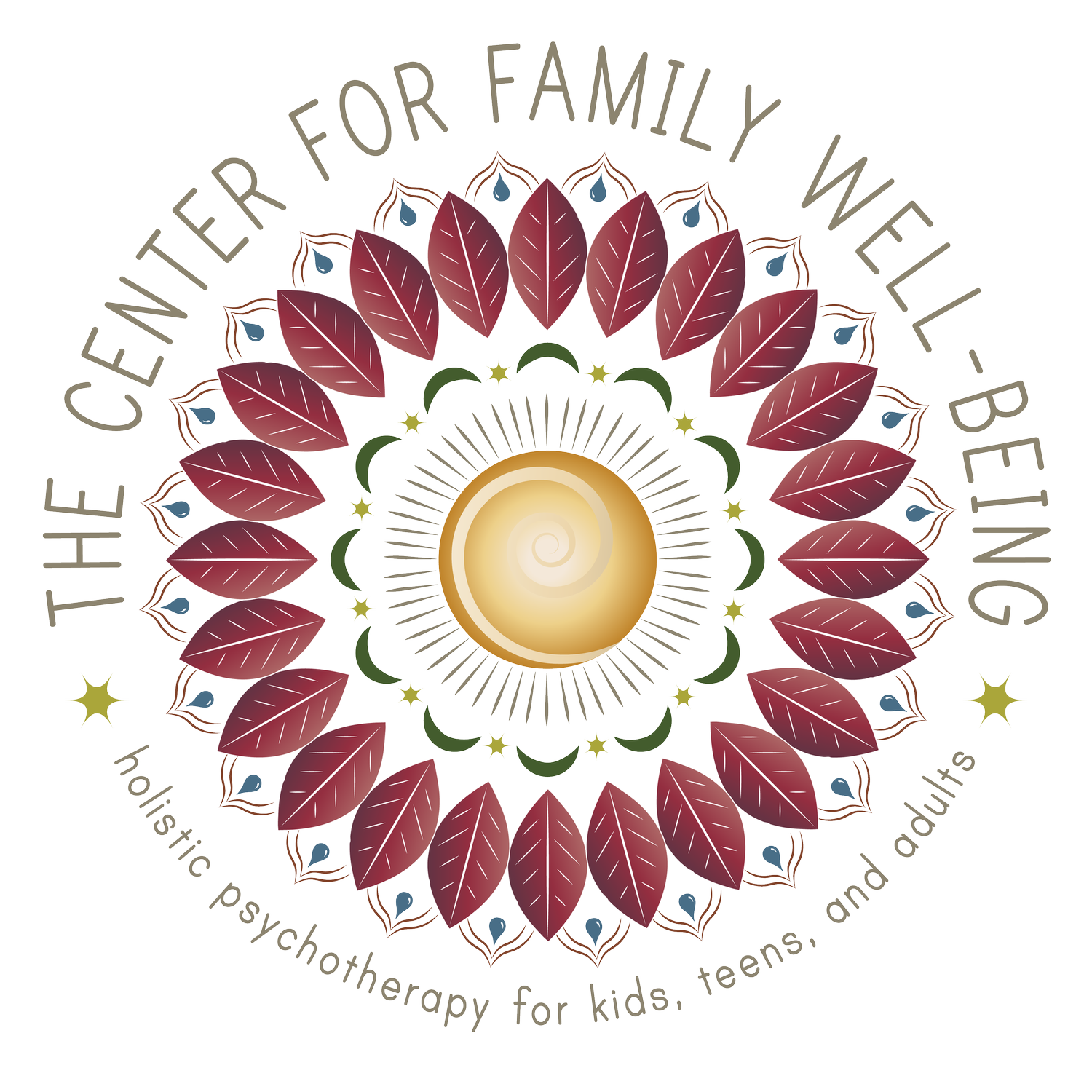Spring 2023: Resources We Love
Springing Forward
The days are trickling longer into the evenings, giving us all a little more time to come out of our winter repose and stretch into the warm and fresh routines of spring — a perfect time to take a look at ourselves, our needs, and our potential with a sense of bright-eyed curiosity.
We feel this movement and welcome change at The Center for Family Well-Being, where we’re experiencing a blooming of new workshops and offerings — you may have even noticed our updated logo!
We can’t wait to share more of this newness with you alongside our always-available clinical offerings. If you’re also feeling the winds of change this season, please know we’re here to provide steadiness and balance while helping you and your child or teen grow in a new direction.
On a personal level, our therapists are letting in the light of inspiration and renewal as well! Here are some of the resources that are energizing their minds, bodies and hearts this spring. We hope they’re equally beneficial to you.
Stephanie Brown
I’ve used Emotional Freedom Technique (EFT) and tapping in the past, but this spring it has really blossomed for me. This is in part thanks to Center therapist Elizabeth Ebaugh and one of her recent supervision trainings. I read The Tapping Solution for Manifesting Your Greatest Self and it helped me get into the rhythm of tapping as a way of coping with stress and stepping more fully into the present. A Heart That Works is a powerful memoir written by comedian/actor/producer/author Rob Delaney. Delaney shares about his one-year-old son's cancer diagnosis and eventual death, all with unflinching honesty, vulnerability, and humor. I found it to be a valiant grief companion and I think others who have lost a loved one — especially a child — will, too.
Aryn Davis
The spring season can bring about both bursts of light and bursts of change. For school landscapes, this means preparing for the end of the year, which of course, comes with the added stress and pressure of standardized tests, final projects, and cumulative exams. I've found that getting into the rhythm of moving the body first thing in the morning or in the evenings can help release stress and move stagnant energy through the body. This not only reduces anxiety symptoms, but it also makes for better sleep!
One form of movement that I've found to be grounding and nourishing is Qi gong (balanced with a little yoga)! Qi gong is an ancient mind-body practice and a form of Chinese medicine/acupuncture that uses the power of the breath, movement, and intention setting for physical wellness and mental well-being. Lana Reed is our favorite Qi gong practitioner here at the Center, and Jeffrey Chand is one of my go-to teachers for this daily practice. Looking for something quick and kid-friendly? This Simple 13-Minute Qi Gong Routine for Kids by Lee Holden is a great practice to do alone or as a family!
Elizabeth Ebaugh
I would like to give a shout out to Dr. Lisa Miller and her book The Awakened Brain. She brings psychology, spirituality, and science about the brain together with her own life experience in a beautiful way.
Liz Hagerman
Springtime is busy in the natural world: bees buzzing, flowers popping up everywhere, the trees greening — Mother Nature expanding and creating. Yet somehow, even though Nature is ramping up activity, it’s the best place for me to go when I feel stressed by my own ramped-up activity. It helps me slow down, nourishes my senses, and even helps me think more clearly. So, the main resource I recommend is Nature!
In addition, a personal resource I’ve found helpful lately is the Abhyanga massage by Belinda, our Ayurvedic practitioner here at the Center on Fridays, Saturdays, and Sundays. (You can book this wonderful service for yourself at www.wisewomanayurveda.com.)
In my recent work with parents and children I’ve been using “Circle of Security” ideas and recommend this book to parents: Raising a Secure Child by Kent Hoffman, Glen Cooper, and Bert Powell.
Kate Kelly
Okay, so science wasn’t always my easiest subject in school (much to my scientist dad’s chagrin!) but I’ve come a long way since then: I’m steeped in science recently — and loving it!
First up: I’m riveted by Harvard psychiatrist Dr. Chris Palmer’s recent book, Brain Energy. Palmer is both a researcher and practicing clinical psychiatrist who has worked for years with many treatment-resistant mental health conditions, using a variety of standard treatments. Here, he does a deep dive into our existing knowledge of mental illness and brings the literature together in a single framework — integrating biological, psychological, and social research to argue that mental illness disorders are metabolic disorders of the brain. It’s what he calls the “brain energy” theory of mental illness.
He explores deeply our mitochondria, known as the “powerhouses of the cell.” It turns out these magnificent mitochondria are much more than just little batteries: some are on the move to places in cells where energy is needed. In addition to helping to maintain existing cells, mitochondria eliminate old and damaged cells while helping regulate our metabolism, immune system function, stress responses, and much more. Bottom line: when mitochondria aren’t working, neither is the human body or brain.
While Palmer is not at all dismissive of current treatments — including psychotherapy and medication — for mental health conditions, he encourages us to go beyond the standard treatments he’s used in his own practice for years. In his own practice, he’s found success with the medical use of the ketogenic diet for some patients with treatment-resistant mental health conditions, a topic on which he’s now actively researching and publishing.
And if you like to listen as well as read, my favorite science podcast these days is the Huberman Lab Podcast with Stanford neuroscientist Andrew Huberman. Check out his recent podcast on how to Leverage Dopamine to Overcome Procrastination and Optimize Effort. You’ll find great tips on how to boost motivation if you’re in a rut and how to build and maintain a growth mindset. Lots here for me to work with, and to translate and share with my clients!
Amy Murphy
If this season finds you looking for ways to boost both your internal and external wellness, then you’ll enjoy my holistic resource for healthy skin.
Functional skincare is a unique, wellness-focused approach that recognizes that achieving healthy, beautiful skin involves much more than treating just the skin itself. Susanne Siemonsen founded Skin Therapy (www.myskintherapy.net) on this idea, and she has spent the past 15 years giving her clients the tools to transform their skin in simple, holistic, and functional ways. Susanne is constantly learning and expanding her wellness offerings, which now include infrared sauna and massage. I consider Susanne a healer, and I always leave her office feeling better than when I entered. She's the perfect resource to help you "spring forward" with healthy skin!
Lisa Oakley
Spring is always a time when we indulge our senses — so many sights, sounds, and aromas that have been dormant during the winter suddenly emerge. This spring I picked up a copy of Life in Five Senses: How Exploring the Senses Got Me Out of My Head and Into the World by Gretchen Rubin (author of The Happiness Project). This really brought home for me the importance of taking in the world around me with a new and more intentional approach.
An opportunity to practice this mindset recently presented itself in my own backyard. We have a large elm tree in our small yard and each spring it hosts what I think of as the bird version of Coachella. Except the concert starts around 4:00 a.m., well before the sun is up! In the past I have taken to wearing ear plugs and burying my head under a pillow, annoyed that these early birds can just flout the noise ordinances with impunity. This year, I decided to shift my perspective and instead of trying to drown out their calls and songs, I embraced them and thought of it as a free early-morning concert. Without opening my eyes I listened closely to their notes and their back-and-forth banter. I came to recognize their distinct calls and patterns and I found that instead of being annoyed, I actually enjoyed it — and in this pleasant state of mind it was much easier to drift back to sleep. In her book, Rubin talks about how she reawakened her senses after a scare that she might lose her sight. This led to a new appreciation for what she saw all around her. It's a nice reminder that we can shift our perspective and be in the moment by absorbing the world through our senses. Happy spring!
Lida Sunderland
This spring I'm reading and talking to my clients about Lane Moore's new release, You Will Find Your People: How to Make Meaningful Friendships as an Adult. As a comedian, writer, and actor, Moore discusses what can be a deeply vulnerable and challenging task with intimacy and eloquence, as well as a good dose of humor. Moore reveals her own experience, and while she doesn't offer concrete tools per se, she proposes valuable frameworks for processing big questions and managing common relational stressors. She also carefully debunks some of the myths about friendships that we learn as children; namely that their value is derived from how long they last, and that all struggling or fading friendships must be saved by any means necessary. She normalizes growth and change, especially the hard sort. Best of all, she provides her readers with the comforting, genuine reminder that they are not alone in their fraught quests for companionship. But rather than leave readers feeling despair, she manages to foreground the joy that exists in the complex process of making adult friends — a process that is ultimately about deepening one's relationship to themself.

